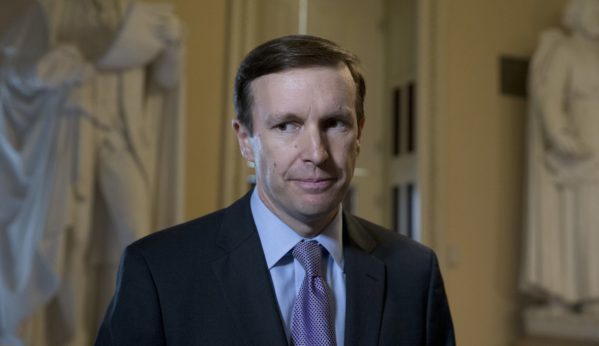
Shockwaves and outrage spread around the world yesterday after the U.S.-backed Saudi coalition slaughtered as many as 50 children and other civilians on a school bus in a crowded shopping center in South Yemen.
With U.S. air support and cover, bombs were dropped onto the bus and into the market killing and maiming innocent civilians. This latest slaughter comes on top of the deaths of as many as 30,000 civilians in South Yemen as a result of bombings by the U.S.-Saudi coalition in the three-year drive by Saudi Arabia and the United Arab Emirates, with U.S. support, to seize control of that country.
Sen. Chris Murphy, D-Conn., said in an angry tweet last night:
“U.S. bombs. U.S. targeting. U.S. midair support.
“And we just bombed a SCHOOL BUS.
“The Saudi/UAE/U.S. bombing campaign is getting more reckless, killing more civilians and strengthening terrorists inside Yemen. We need to end this NOW.”
Murphy has been an ongoing critic of U.S. participation in the Saudi/UAE coalition. Though the U.S. role in the war precedes the presidency of Donald Trump, it has increased dramatically under his administration.
Not mentioned in press reports on the bombing yesterday was the web of financial ties between the main Mideast players attacking South Yemen and Trump, as well as a host of other Republicans.
The Associated Press reported on March 26 that George Nader, an adviser to the UAE and now a witness in Robert Mueller’s investigation into foreign interference in U.S. elections, wired $2.5 million to a GOP operative working for Trump in an attempt to influence U.S. policy against Qatar and tilt it instead in favor of the UAE.
Ed Royce, a GOP congressman in California, received $5,400 in contributions from the UAE just before he introduced a bill to brand Qatar as a “terrorist country,” also according to the AP. The press service reported, too, that $600,000 additional UAE dollars went to a variety of U.S. representatives to buy their support for the Royce legislation.

Clearly what has happened is that U.S. foreign policy, which can result in anything up to and including the killing of innocent children, is up for sale at the White House to the highest bidder. (On the same day that the bombing of the school bus was reported, it was also revealed during the ongoing Paul Manafort trial that the position of Secretary of the Army had been up for sale by Trump’s campaign manager two years ago.)
The buyers and sellers of foreign policy coming into and going out of the White House couldn’t care less, however, about the reports yesterday that the Red Cross had taken in the bodies of 29 Yemeni children, all under 15 years of age, and that it was treating 48 injured people, among them 30 children.
The school bus was transporting children after a picnic, according to reports from Save the Children and Al Jazeera. A rare respite from terror for these children ended in their deaths.
Television viewers here in the U.S. saw images last night of bleeding children and scattered body parts surrounding the remains of the bus.
MSNBC commentator Chris Hayes said that if a foreign power had bombed a school bus in the U.S. it would be a cause for war but that a foreign power, the U.S., had done precisely that to innocent civilians in South Yemen.
Al Jazeera counted 43 people as killed and 61 wounded in the attack.
The coalition claimed it had targeted “missile launchers,” but local and international journalists charged the claim was false. They noted that there have been many attacks on schools and family gatherings and that there was no military target near the marketplace.
Organizations around the world are demanding an end to the war.
“This is yet another example of the blatant violations of international humanitarian law that we have seen in Yemen over the past three years—from indiscriminate and disproportionate attacks on civilians, denial of access to humanitarian aid and the use of starvation as a weapon of war—it’s the people of Yemen, not the warring parties, who are paying the ultimate price,” said Sylvia Ghaly, director of advocacy in Yemen for Save the Children, in a statement.

“There is no military solution to this conflict,” she added. “Only a political solution can bring the war to an end and reinstate peace in Yemen. We urge all parties to agree to an immediate cessation of hostilities, return to the negotiation table to commit to a ceasefire, and cooperate with the U.N. Special Envoy Martin Griffiths. Spare the Yemeni people more death and misery.”
The U.S. role in Yemen unfortunately is similar to the role it has played in other countries in the region.
South Yemen actually had, relative to today, a secular, progressive government from 1967 until 1990 (the People’s Democratic Republic of South Yemen). For some of those years, socialist countries, including the Soviet Union and Cuba, were involved in building up the oil industry in the country, construction of roads, and the establishment of schools and hospitals.
By 1990, U.S.-backed religious fundamentalists and other right-wing forces in North Yemen prevailed and South Yemen was absorbed into a united Yemen. The U.S. then built a substantial military base in the country. Since the late 1990s, however, rebel groups have been fighting for the establishment again of a South Yemen independent of the North.










